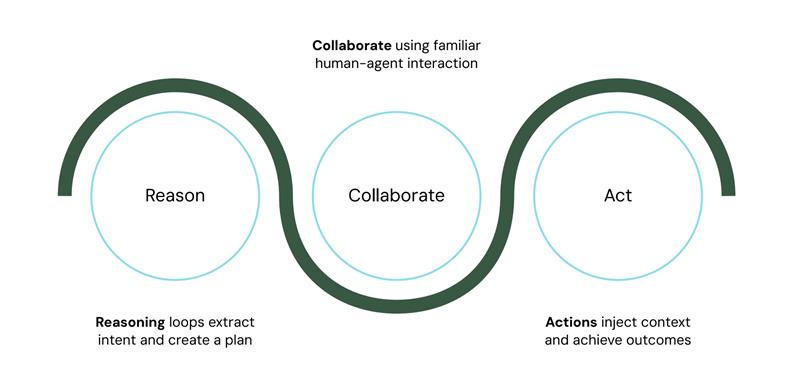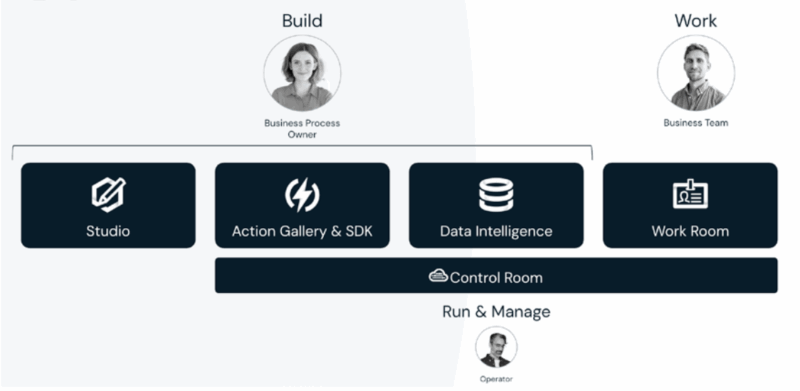Table of Contents:
- What are enterprise AI agents?
- How enterprise AI agents operate
- Why enterprises need AI agents now
- Types of AI agents and how they work
- Understanding AI agent orchestration
- The challenges of enterprise AI agents and how to solve them
- Designing enterprise AI agents that work
- Why Sema4.ai? Our edge in enterprise agent orchestration
- Embracing the future of enterprise AI agents
A new era of enterprise intelligence
The enterprise technology landscape is experiencing significant changes as organizations move from traditional chatbots and copilots towards more advanced enterprise AI agents. These autonomous, goal-oriented systems take intelligent automation further through reasoning, planning, and executing complex workflows with minimal human input.
Unlike previous technologies, enterprise AI agents act as independent decision-makers that can perceive their environment, retain memory of past interactions, and take purposeful actions to meet specific business objectives. This shift is reshaping workflow automation and driving improved operational efficiency. For AI solution architects, enterprise IT leaders, and innovation teams, understanding the capabilities and deployment strategies of enterprise AI agents is now important for maintaining a competitive position. This comprehensive guide examines what enterprise AI agents are, how they differ from existing automation tools, and introduces Sema4.ai’s SAFE deployment framework for the scalable and secure orchestration of agents within complex enterprise systems.
What are enterprise AI agents?
Enterprise AI agents are sophisticated software systems, specifically designed for business environments, that operate with a high degree of autonomy. Powered by advanced large language models, these agents go beyond traditional automation tools and basic AI assistants by independently comprehending their surroundings, tackling complex challenges, and retaining information for future application. They are capable of executing tasks to meet specific business objectives without the need for constant human oversight.
LLM-powered enterprise AI agents operate with skilled-worker-level autonomy. This means they can make informed decisions and adapt to changes without requiring detailed step-by-step instructions. These agents integrate into enterprise workflows to drive efficiency and decision-making.
- Reason: Agents evaluate goals, assess options, and make decisions by leveraging advanced LLMs and enterprise context. They analyze situations holistically, considering available data, business rules, and past experiences to determine the best course of action.
- Collaborate: Through natural language interactions that feel familiar and intuitive, agents work seamlessly with humans and other agents. They understand context, ask clarifying questions when needed, and provide clear explanations of their thinking, making collaboration effortless and productive.
- Act: Agents don’t just think and talk – they get work done by executing workflows across your enterprise tools and systems. Using secure, pre-built actions and custom integrations, they can interact with applications, process documents, and manage data while maintaining complete auditability.

This approach represents a shift from reactive copilots, which require user prompts, to proactive agents that can initiate actions based on environmental triggers, business rules, or set goals. While copilots assist users in completing tasks, enterprise AI agents can independently manage entire workflows, adapt to changing conditions, and enhance their performance through continuous learning. In practical applications, a copilot might assist a user in writing an email, whereas an enterprise AI agent can oversee customer communications, identify issues that need escalation, draft suitable responses, route them through approval processes, and track resolution outcomes—all without human intervention unless exception handling is necessary.
How enterprise AI agents operate
Enterprise AI agents function through a continuous loop of perception, reasoning, and action.
- The agent monitors its designated environment, collecting information from various sources including databases, APIs, sensor data, and user interactions.
- Following perception, the agent engages in reasoning and planning. Using its built-in intelligence, the agent analyzes the collected data against its knowledge base and predefined objectives. It identifies patterns, evaluates potential actions, and formulates a strategic plan to achieve its goals. This planning phase considers available resources, constraints, and potential risks. Based on the planned approach, it chooses the most suitable methods for task execution, whether that involves calling specific APIs, accessing databases, or triggering other automated processes.
- Finally, the agent executes the planned actions, monitoring the results and adjusting its approach as needed.
For example, when handling an IT support ticket, an enterprise AI agent first perceives the incoming request by analyzing the ticket description, priority level, and user information. It then reasons through potential solutions by consulting its knowledge base and checking system status. The agent selects appropriate diagnostic tools and APIs to investigate the issue, executes troubleshooting steps, and if successful, automatically resolves the ticket while updating all relevant systems and notifying the user of the resolution.
Why enterprises need AI agents now
Enterprise automation with AI agents is transforming how businesses operate, emphasizing the need for cost reduction, expedited decision-making, and consistent global service delivery. Traditional automation often falls short due to the substantial manual input required and its inflexibility to adapt to changing business needs. Intelligent automation, powered by enterprise AI agents, overcomes these limitations by managing complex, multi-step processes with minimal human intervention.
- For example, in finance, these AI agents streamline insurance claims processing by automating documentation collection, information validation, and case review directives.
- In telecommunications, AI enhances network routing efficiency by analyzing traffic and adjusting settings to maintain service quality.
Enterprise AI agents reduce cost, accelerate insights, and bring consistency to global operations. Cost savings are realized through automation, decision-making is accelerated with real-time data insights, and consistency in managing complex workflows is enhanced. For example, healthcare organizations report a 40-60% reduction in administrative processing times when using AI agents for patient scheduling and insurance verification.
By replicating the decision-making processes of skilled professionals, these agents ensure consistent service quality irrespective of geography. As businesses expand, maintaining high standards across diverse markets becomes increasingly crucial. Focusing on these tangible outcomes highlights the importance and benefits of embedding intelligent automation within enterprise operations.
Types of AI agents and how they work
In the enterprise world, various types of AI agents play essential roles in enhancing efficiency and decision-making.
Reflex agents, for example, work on simple condition-action rules, making them perfect for routine tasks with clear parameters. On the other hand, goal-based agents are more sophisticated, as they can formulate plans and adapt strategies to achieve specific objectives, making them ideal for complex scenarios. Utility-based agents evaluate multiple options based on predefined criteria, optimizing decisions according to organizational priorities. Multi-agent systems, which involve multiple specialized agents working together, are often employed to manage complex workflows across different departments.
Enterprises also explore using copilots and autonomous agents, though the distinction is significant. Copilots assist and enhance human capabilities by offering suggestions, while autonomous agents independently execute tasks within defined parameters.
For a more detailed exploration of AI agent types and their applications, refer to our comprehensive guide on this subject.
Understanding AI agent orchestration
AI agent orchestration is the process of coordinating and managing multiple specialized AI agents to work together toward achieving larger business objectives. Rather than deploying isolated agents that operate independently, multi-agent orchestration creates a unified system where agents communicate, share information, and coordinate their activities to complete complex, multi-step business processes.
The importance of AI agent orchestration becomes clear when considering enterprise-scale deployments. Individual agents may excel at specific tasks, but orchestration ensures agents work in sync to complete multi-step workflows. For example, a customer onboarding process might involve agents specialized in document verification, system provisioning, compliance checking, and communication management—all working in coordinated sequence.
Orchestration platforms manage task delegation, data flow between agents, error handling, and performance monitoring across the entire agent ecosystem. Without proper orchestration, enterprises risk creating fragmented agent deployments that fail to deliver cohesive business value or scale effectively across organizational needs.
The challenges of enterprise AI agents and how to solve them
Implementing enterprise AI agents introduces several critical challenges that organizations must address to ensure successful deployment. AI governance represents the most significant concern, as autonomous agents make decisions that can impact business operations, customer relationships, and regulatory compliance. Establishing clear governance frameworks ensures agents operate within acceptable parameters while maintaining transparency and accountability.
AI compliance challenges become particularly complex in regulated industries where agents must adhere to specific legal and regulatory requirements. Financial services organizations must ensure their agents comply with banking regulations, while healthcare providers must maintain HIPAA compliance in all agent interactions. These requirements demand sophisticated audit trails, decision logging, and explainability features.
Deploying ethical AI agents across enterprise systems requires major security considerations. Agents require access to sensitive data and systems to function effectively, creating potential vulnerabilities that malicious actors could exploit. Implementing robust security frameworks, including encryption, access controls, and continuous monitoring, becomes essential for protecting organizational assets.
Sema4.ai’s SAFE (Secure, Accurate, Fast, Extensible) framework addresses these risks head-on by governing scale, adaptability, and transparency. This framework enables organizations to realize the benefits of AI agents while maintaining the control and oversight necessary for enterprise-grade deployment.
Designing enterprise AI agents that work
Building enterprise AI agents that perform reliably and scale with business needs requires deliberate design. Sema4.ai’s SAFE framework lays the foundation, ensuring agents are robust, governable, and aligned with enterprise standards. SAFE agents integrate with internal systems, understand business context, and autonomously execute end-to-end tasks using structured workflows.
- Scalable agents handle growing complexity without performance loss. That means supporting higher volumes, concurrent tasks, and deep system integration.
- Adaptable agents evolve in real time. They learn from experience, refine decisions, and adjust behaviors as business requirements change.
- Flexible agents operate across tech stacks. They connect to diverse systems and adapt to multiple use cases without custom builds.
- Explainable agents don’t operate in a black box. They expose decision logic, enable auditability, and build trust through transparency.
Effective design also requires strong security, contextual memory, and real-time feedback. Enterprise AI agents must protect data, retain context, and adapt to changing inputs while staying in lock-step with enterprise goals and requirements.
Why Sema4.ai? Our edge in enterprise agent orchestration
Sema4.ai Studio simplifies enterprise AI agent development and orchestration, and is a key component of Sema4.ai’s comprehensive platform that transforms how organizations build, deploy, and manage AI solutions at scale. Through its innovative Runbooks feature and enterprise-grade architecture, Sema4.ai Studio enables secure orchestration of AI agents while maintaining complete visibility and control.

Sema4.ai Studio: Where AI agents come to life
Transform business expertise into production-ready AI agents using natural language Runbooks. Sema4.ai Studio empowers teams to build sophisticated agents without extensive coding, connecting them to enterprise apps through pre-built actions while maintaining enterprise-grade security and observability.
Action gallery: Connect to everything
Seamlessly integrate AI agents with your enterprise ecosystem through our extensive Action Gallery. From SharePoint to SAP, connect to hundreds of applications using pre-built actions, MCP servers, or create custom integrations using our comprehensive SDK and automation-as-code framework.
Data intelligence: Unlock enterprise knowledge
Enable agents to leverage your organization’s collective intelligence through advanced document processing, zero-copy data access, and comprehensive Knowledge Base support. Agents can reason over unlimited context from internal documents, emails, support tickets, and historical conversations, ensuring actions are grounded in real insights while maintaining enterprise security standards.
Control Room: Enterprise-grade management
Deploy and manage AI agents with confidence using our robust Control Room. Built for enterprise needs, it provides complete lifecycle management, real-time observability through integration with tools like Splunk and Datadog, and seamless integration with your existing security infrastructure—all within your AWS VPC or Snowflake boundary.
Work Room: Where humans and AI collaborate
Experience secure, transparent collaboration between teams and AI agents in our purpose-built Work Room. With intuitive interfaces, role-based access control, and seamless SSO integration, Work Room enables business users to work effectively with AI agents through our purpose-built UI, API, and even Slack and Microsoft Teams.
Together, these components create an unmatched enterprise AI orchestration platform, combining innovative agent development tools with the security, scalability, and control that enterprises demand. Experience the future of work with Sema4 Studio – where enterprise AI meets operational excellence.
Embracing the future of enterprise AI agents
The transition from traditional automation to enterprise AI agents represents more than a technical shift; it’s a redefinition of how enterprises operate. Organizations that embrace this evolution position themselves to achieve significant competitive advantages through improved efficiency, reduced costs, and enhanced service quality.
The key to successful implementation lies in adopting structured approaches that address the unique challenges of enterprise AI deployment. Through proper governance, security measures, and deployment frameworks like SAFE, organizations can realize the full potential of intelligent automation while maintaining the control and oversight necessary for enterprise-grade operations.
As the enterprise AI landscape continues to evolve, organizations that invest in comprehensive agent orchestration platforms will be best positioned to adapt to changing requirements and capitalize on emerging opportunities. The future belongs to organizations that can effectively harness the power of autonomous, goal-driven AI agents to transform their business operations.
Ready to transform your enterprise operations with intelligent automation? Explore Sema4.ai’s SAFE approach to intelligent automation and discover how our comprehensive platform can help you build, deploy, and manage sophisticated AI agents that deliver measurable business results.

